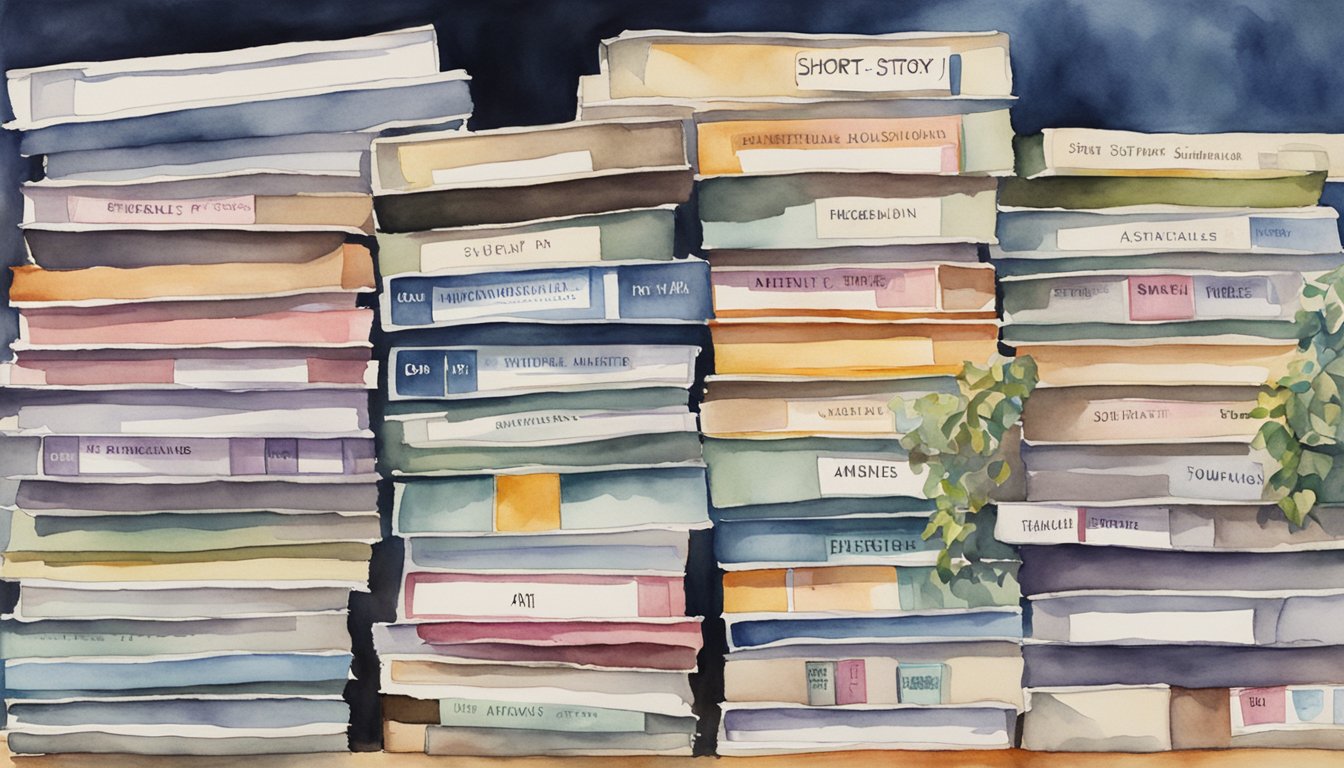Venturing into the world of short story writing can be both a passionate creative pursuit and a practical way to earn money. If you’re a writer, the good news is that numerous magazines out there are willing to pay for your stories. These publications value the craft and can offer you not just compensation, but also exposure to a wider audience which is invaluable for building your reputation as a writer.

Understandably, navigating through the array of magazines can seem daunting, but with a strategic approach, you can find the right places to submit your work. Each magazine has its own preferences in terms of style, genre, length, and other submission guidelines, and respecting these preferences increases your chances of getting published. Moreover, the submission process is a learning experience that can hone your skills in presenting your work professionally.
Key Takeaways
- Magazines offer payment and exposure for well-crafted short stories.
- Submissions to magazines require adherence to specific guidelines and preferences.
- The submission process is an opportunity for professional growth in writing.
Understanding Short Story Publications

When looking to publish your work, it’s important to recognize that each type of short story publication has its own unique set of preferences and requirements. Here’s a guide to help you navigate the diverse landscape.
Literary Magazines
Literary magazines often seek a broad spectrum of styles, showcasing the best of literary excellence. Think of them as a canvas for contemporary, literary fiction or poetic narratives. They tend to favor rich, character-driven stories that reflect the human experience. These publications can either be in print or online and usually offer payment for selected stories. Diversity is key in literary journals; they celebrate short stories that challenge the norm and resonate on a deep, artistic level.
Genre-Specific Magazines
If you’re passionate about a particular genre, genre-specific magazines want to hear from you. These periodicals cater to specific tastes and range from science fiction, fantasy, and horror, to romance, crime, dark, erotica, and even western or slipstream. What’s essential is that you tailor your story to fit the themes and styles these magazines are known for. This focus increases your chances of publication and, consequently, compensation.
Online Publications
In the digital age, online publications have become a powerhouse for short story writers. They’re accessible, often have quicker response times, and a wide readership. These platforms might focus on general fiction or be geared toward specific genres. Their submission process is usually streamlined with an online form or email system. Online venues range from well-established magazines to emerging platforms, all looking for engaging content that holds readers’ clicks. It’s an exciting opportunity for writers who are ready to share their work with a potentially vast online audience.
The Submission Process
https://www.youtube.com/watch?v=237zde4du9k&embed=true
When you’re ready to send your short stories out into the world, understanding the submission process is crucial. It’s not just about sending your work anywhere; it’s about finding the right fit and following the rules to the letter.
Researching Markets
First, you need to research potential markets. Look for magazines and publications like AGNI that align with your genre and style. Take note of what they’ve published before to gauge if your story is a good match.
- List the type of short stories each market publishes.
- Note down the audience and themes they cater to.
Submission Guidelines
Carefully read the submission guidelines. Magazines like The New Yorker have specific requirements on how to format your submission and where to send it.
- Outline the submission process, deadlines, and formats accepted.
- Follow the instructions on how to submit (online submission portals, email, etc.).
Word Count and Style
Each publication has a preferred word count and style. For instance, Baltimore Review often stipulates a maximum word count for fiction and nonfiction.
- Adhere to the specified word count limits.
- Tailor your story’s prose to meet the publication’s expected style.
Editorial Preferences
Understand the editorial preferences to increase the likelihood of your story being accepted. Editors are looking for distinct voices and fresh perspectives like those showcased in Reedsy.
- Recognize the tone of stories they prefer.
- If possible, reference past issues or featured work to understand what might resonate with the editors.
Navigating the Publishing Landscape

Before you start submitting your short stories, it’s crucial to know which magazines align with your writing style and goals. Whether you’re seeking financial rewards or looking to gain exposure in the literary community, understanding the publishing ecosystem will serve as a foundation for your writing career.
Top-Paying Magazines
Some of the highest paying magazines for short fiction include The Sun, Ploughshares, and The Atlantic. The Sun offers a unique blend of personal essays, poetry, and fiction and is known for paying well for short stories. Ploughshares, a literary journal based at Emerson College, also ranks high in payment rates. Be sure to also check out The Georgia Review and AGNI, both of which have a reputation for rewarding their contributing writers generously.
International Writers and Markets
As an international writer, you have a plethora of options like Strange Horizons and Asimov’s Science Fiction, which are open to global submissions. Strange Horizons is a platform for speculative fiction and poetry, and it actively seeks out and encourages contributions from international writers. Asimov’s Science Fiction is another popular choice that accepts stories from around the world, offering not just publication but the potential for exposure in a trending genre.
Understanding Payment Rates
Payment rates can vary widely, so it’s important to read each magazine’s submission guidelines carefully. Some magazines, like One Story and Black Warrior Review, may offer a flat rate per piece or per word. For instance, One Story pays $500 for each accepted story, while other magazines like Black Warrior Review pay a per-word rate, also providing a complimentary copy of the issue.
Exposure and Career Advancement
Securing a publication in renowned magazines such as The Sun or The Atlantic can significantly boost your visibility and position you as a serious writer. Similarly, having your work in genre-specific publications like Vestal Review or AGNI can open doors to a more targeted audience. Remember, it’s not just about earning potential—being published in respected outlets yields valuable exposure, contributing to your long-term career growth.
Genres and Diverse Forms
https://www.youtube.com/watch?v=tnpgfCqR1UM&embed=true
As you search for magazines that are eager to publish and pay for short stories, remember that your genre and format heavily influence where your work might fit best. From traditional to speculative themes, there’s a range of styles awaiting your creative touch.
Exploring Different Genres
Literary fiction often gravitates towards deeper, more complex themes, offering you a chance to showcase character-driven tales that ponder life’s intricacies. If your work features otherworldly elements, science fiction could be your calling, with magazines seeking stories that push the boundaries of technology and human potential. If you’re drawn to the supernatural or macabre, horror magazines await your most chilling tales.
On the other hand, for those of you who love to explore “what-if” scenarios, speculative fiction is a broad category that encompasses elements of the fantastical, dystopian, and beyond. And if you’re keen on grounding your stories in reality, many publications highlight personal essays that reflect your experiences and insights in narrative form.
Flash Fiction and Other Formats
Dive into the compelling world of flash fiction, where every word counts, and brevity is key. This format challenges you to tell a complete story in usually under 1,000 words—perfect for capturing a moment or an impactful twist.
Here’s a quick look at the formats awaiting your stories:
- Flash Fiction: 500-1,000 words
- Short Fiction: 1,000-7,500 words
- Micro Fiction: Up to 100 words (often for digital platforms)
It’s not just about word count but how you use those words to engage with universal or niche themes. Your unique voice can find a home in the diverse arenas of modern storytelling.
Strategies for Writers
https://www.youtube.com/watch?v=G6xcpMIvJ04&embed=true
As a writer aiming to publish short stories, fine-tuning your crafting techniques and making the most of writing resources can significantly elevate your work.
Crafting Engaging Stories
Your ability to create captivating narratives hinges on a blend of imaginative storytelling and a distinctive writing style. First, consider the essence of your story—what emotional journey do you want to take your reader on? Use bold themes that resonate and characters that live beyond the page. Each story you write should offer a unique perspective, something that sets you apart from the rest. Talented writers often have a signature element, whether it’s their voice, character development, or plot construction.
When participating in writing contests, adhere to their specific guidelines while still injecting your personal flair. Contests can provide structure and deadlines that encourage you to polish your work diligently.
Utilizing Writing Resources
Take advantage of available resources designed to refine your writing:
- Writing Workshops: Peer feedback can unveil new insights into your work, helping you tweak and improve.
- Online Forums: Places like Reddit’s r/writing offer a hub for support and critique from fellow writers.
- Editorial Services: Professional editors can help tighten your narrative, ensuring that your story is succinct and powerful.
- Submission Trackers: Tools to keep tabs on where and when you’ve submitted your stories, so you can follow up accordingly.
Remember, the most successful short stories are often those that have been reviewed and revised numerous times, so don’t hesitate to revise your drafts. For inspiration and guidance, you might look into notable publications that offer compensation for short stories, such as Allegory and The New Yorker, which can also be a benchmark for the quality of storytelling that is sought after by editors.
Market Research Tools

When you’re getting ready to submit your short stories for publication, knowing where to find the right markets can be pivotal. Familiarize yourself with the databases and communities designed to streamline your search and connect you with publishers.
Literature Databases and Directories
Duotrope serves as a comprehensive literature database where you can track down numerous magazines and anthologies hungry for your short stories. Specialized search filters allow you to narrow down prospects based on genre, payment rates, and submission deadlines. Remember, Duotrope is a subscription-based service, but it’s a small investment that could yield invaluable research.
- Subscription-Based Services:
- Duotrope: Tailored search capabilities
- Other databases (for comparison)
Additionally, directories curated by the Submission Grinder also provide extensive lists of potential markets. These tools often come at no cost and can be an excellent starting point if you are new to the submission process.
Writer’s Communities
Engaging with writer’s communities can be as beneficial as any database, as they offer real-time discussions and shared experiences. These groups often circulate calls for submissions and provide insights on editors’ preferences or recent market trends.
- Communities Help with:
- Networking: Connect with writers and editors.
- Submission strategies: Learn from shared experiences.
Whether posting in forums or joining discussions on platforms like Reddit or Scribophile, you’ll find other writers often share opportunities they’ve encountered which might not be widely advertised yet. Keep your ear to the ground in these communities as a complement to your research.
The Business of Writing

The journey of monetizing your craft involves understanding the markets that pay for short stories and leveraging opportunities presented by writing contests and residencies.
Making Money through Short Stories
If you’re looking to make money from your written words, consider submitting your short stories to publications. Many magazines offer payment for short fiction; however, the rates can vary significantly. For instance, some top-paying magazines could offer hundreds or even thousands of dollars per story, depending on the length and quality of your work. It’s important to review submission guidelines carefully, as well as the rights you are granting, to ensure you’re getting the best deal for your stories.
- Success Tip: Always research the publication to see if it aligns with your writing style and audience.
Writing Contests and Residencies
Writing Contests: A writing competition can be more than just a chance to showcase your work—it may offer substantial cash prizes or publication opportunities. You usually have to pay a small fee to enter, but the experience and potential reward can be well worth it.
- Note: Be wary of scams and always check the legitimacy of the contest before entering.
Residencies: These are opportunities provided by various institutions where writers can apply to spend time in a certain place, fully focusing on their writing. Residencies may come with stipends, housing, and a vibrant community of fellow creatives, like residency programs, making them an invaluable experience for serious writers.
- Advantage: Apart from the financial aspect, residencies offer a nurturing environment for your creativity to thrive.
Each path offers its own set of benefits and challenges, but the primary goal remains the same: to reward your dedication to the craft with monetary and professional gains.
Resources for Ongoing Development
As you venture into the world of short story writing, it’s crucial to continuously develop your craft through various means. A range of resources, such as workshops and online communities, offer a wealth of opportunities for enhancing your skills and connecting with other writers.
Workshops and Feedback
Workshops are invaluable for gaining direct feedback on your work. Joining a workshop can provide you with a structured environment to improve. For instance, Emerging Voices is a literary fellowship that offers workshops among its resources. When you participate in these workshops, your writing is subjected to critique from peers and experienced authors. The feedback is often detailed and constructive, helping you to refine your storytelling and strengthen the specific elements of your prose.
Another such venue is Barrelhouse, which conducts writer workshops that are designed to help you develop your voice and polish your short stories to meet publication standards. The personalized feedback you receive here can guide you on how to create engaging narratives that magazines are eager to pay for.
Online Forums and Events
For continuous self-improvement, engage with the rich community on online forums. These platforms allow you to connect with both novice and seasoned writers, exchange ideas, receive critiques, and keep informed about upcoming events or contests. Participating in forums also gives you the chance to get insights from industry professionals about what publishers are looking for.
Additionally, look out for and participate in online events. These events often feature Q&A sessions, live critiques, and networking opportunities that can be just as beneficial as in-person workshops. They’re also a convenient way to stay involved from the comfort of your home.
Success Stories and Inspiration
The journey to publication can be as compelling as the stories you write. You’ll see, from established authors to startling breakouts, that your passion for writing can find a rewarding platform.
Prominent Short Story Authors
Stephen King, renowned for his supernatural and horror short stories, began by publishing in magazine markets—giving hope to any aspiring writer. J.K. Rowling, initially rejected by multiple publishers, shows how perseverance can lead to unprecedented success with stories that captivate a global audience.
Inspirational Publishing Stories
Imagine submitting a story that taps into the gothic or religious, and it becomes the piece that launches your career. That’s what happened when Unknown Writer X published their gothic tale in Strange Horizons, moving from obscurity to a recognized name. Similarly, Author Y’s inspirational piece in The Sun Magazine not only earned them payment but also a devout following. Your story could be the next to inspire both publishers and readers.
Additional Opportunities
When exploring the realm of paid writing opportunities, don’t disregard the chance to contribute to anthologies or utilize residencies and grants to support your craft.
Writing for Anthologies
Anthologies offer a unique venue for your short stories, where you can have your work published alongside others under a unifying theme or genre. Often, anthologies hold a contest, providing not only publication but also monetary rewards for selected stories. To maximize your acceptance potential, tailor your writing style to fit the anthology’s specified theme and submission guidelines. Keep an eye on calls for submissions from reputable literary organizations and publishers.
Literary Residencies and Grants
Literary residencies provide you with the space and time to concentrate on your writing away from daily distractions. These programs often come with a stipend, which means that you can focus on honing your craft without financial worry. To apply, you’ll typically need to submit a writing sample and a project proposal. Similarly, grants are designed to support writers financially, allowing you to embark on new writing projects or to complete ongoing works. They usually require a detailed application that outlines your planned project and demonstrates your writing style and prowess.




